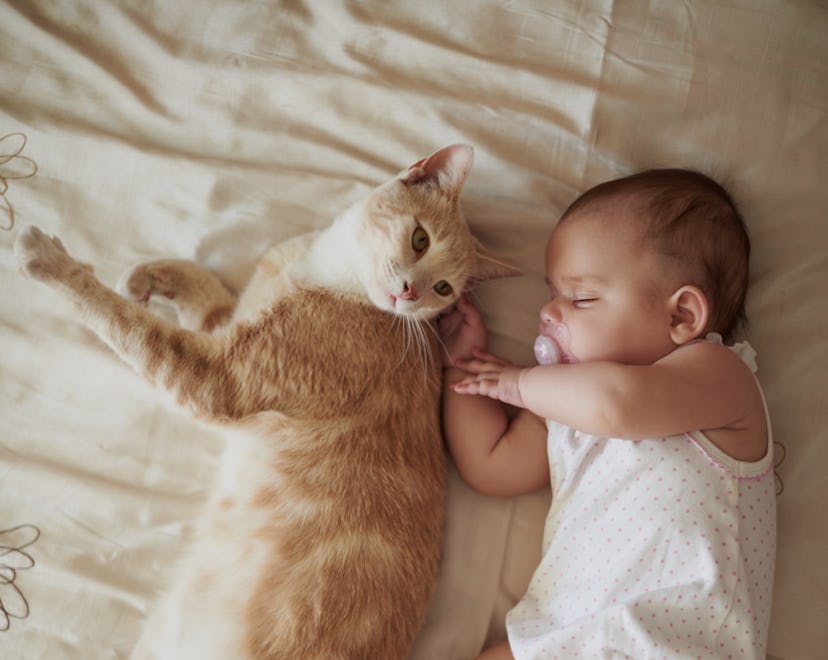Debunked

"The Cat Will Steal Your Baby's Breath" & Other Myths About Cats & Babies
Debunking persistent concerns.
For many families, long before a baby ever enters the picture, there are pets. While dogs occupy the #1 spot in American homes (more than 65 million according to Forbes), cats are in a commanding second place spot with more than 46 million. But in-between that space between dogs and cats lie a lot of misconceptions, myths, and superstitions. When it comes to kitties and our itty-bitties, there’s a lot of misinformation out there. So we’ve rounded up some of the more persistent superstitions about cats and babies that keep us from fully understanding our feline friends.
Does your cat know you are pregnant?
There’s no doubt that our animal friends have intuitions we don’t yet understand. Some loving pet owners swear their cat or dog started behaving differently in response to their owner’s pregnancy. Maybe they start getting more cuddly or, perhaps, even judgier than they were before. But can your cat detect your pregnancy? Scientists have yet to present or be presented with hard evidence that indicates Frisky can tell you’re expecting.
That said, cats aren’t dumb creatures (well, mostly, bless their hearts): they can tell when you are acting different, so they might be picking up on some of the behavior changes pregnancy is prompting in you. They can tell when you’re sleeping more, throwing up (even if they don’t know it’s from morning sickness), or moody, all of which might change how they interact with you. And while we don’t have hard evidence that there’s some sort of feline sixth sense going on, we do know that pregnancy comes with a whole lot of pheromones and hormones, which can emit odors, and that cats have way more scent receptors in their noses than humans – we have about five million while they have 200 million. So who knows what we might learn in the future.
Do you have to get rid of your cat when you’re pregnant?
Sadly, this is a question that comes up a lot, but it’s not simply callous disregard for a pet once a baby comes around; in some cases it’s based on an actual, practical concern. Toxoplasmosis is a parasitic infection that is spread by cats, specifically through their poop, though you can also get it through eating undercooked meat. (Incidentally, this is how cats usually spread it; by eating rodents or birds and then expelling the parasite in their waste.) While toxoplasmosis is usually asymptomatic, the Centers for Disease Control and Prevention (CDC) notes that it can be extremely dangerous to infants, folks with weakened immune systems, and may cause miscarriage. Fortunately, there are simple steps you can take to minimize your risk of encountering toxoplasma gondii. Keep Fluffy indoors (they are less likely to catch and eat infected critters inside) and don’t feed them raw or undercooked meat. Have their litter box cleaned daily, since the toxoplasma parasite only becomes infectious one to five days after it’s shed in the cat’s feces, but avoid cleaning it yourself if possible (aka make someone else do it). And while hanging around your cat is fine, you should avoid stray cats, especially kittens (I know: but sacrifices must be made), and avoid adopting a new cat while you’re pregnant, which is probably decent advice regardless of dangerous parasites.
In other words, exercise caution, and don’t evict your kitty.
Will a cat steal a baby’s breath?
This belief has persisted for a long time, but it is in fact just a myth: your cat is not going to steal your baby’s breath. Lots of folks have given reasonable-sounding evidence to back it up. “Cats cuddle up near a baby for extra warmth and smother them” or “Cats smell milk on a baby’s breath and are attracted to it.” But while these things may sound plausible, they don’t back up the idea that Whiskers is plotting anything sinister.
“Obviously a cat doesn’t literally steal a baby’s breath,” you may be scoffing. “But surely they pose a suffocation risk.” Sure, though this seems to be more a technical possibility than something you should be losing too much sleep over, as there is scant documentation of cats even being suspected in accidental infant deaths. That said, the American Academy of Pediatrics (AAP) recommends that babies sleep alone on a firm, flat surface with nothing but a fitted sheet. No blankets, pillows, or stuffed animals and certainly no cats should be in there with them. As with any animal, do not leave them with your baby unattended.
Do cats hate babies?
In many ways, cats are like people, and one of those ways is that whether or not cats like kids depends on the individual. A 2018 study published in Frontiers in Veterinary Science found that cats (especially older cats) tend to have more positive relationships with adults than little ones. There are so many factors that go into any human-feline relationship that it’s hard to make blanket statements. Generally speaking, though, it makes sense that cats, like some people, don’t like their environment or routines disrupted and babies bring a lot of disruption which can taint the relationship from the get-go. Fortunately, by giving your kitty space, continuing to give them individual love and attention, and encouraging your child to play gently early on, you can set up a sweet relationship between your child and cat that will last for years to come.